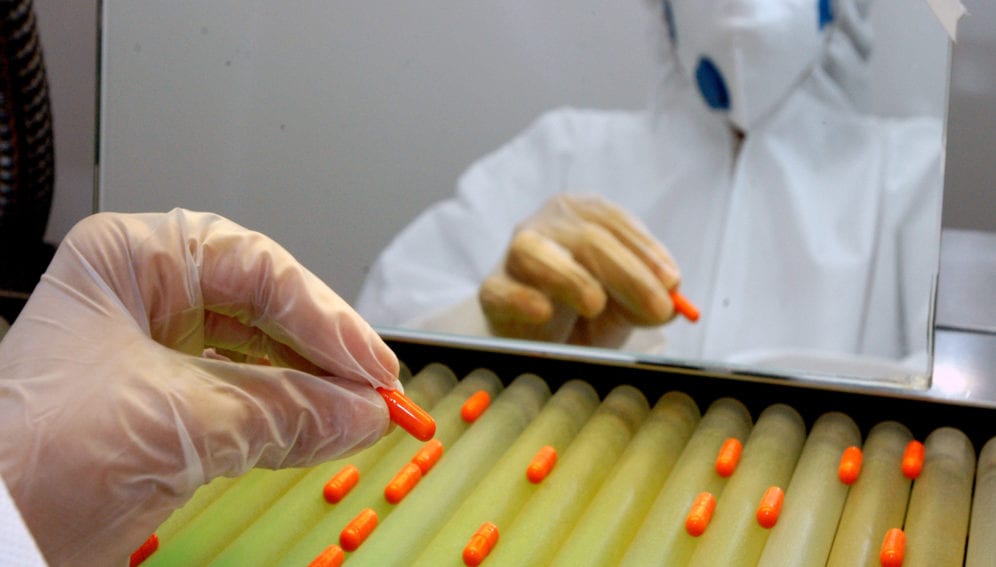Send to a friend
The details you provide on this page will not be used to send unsolicited email, and will not be sold to a 3rd party. See privacy policy.
[BUENOS AIRES] An Argentine foundation has asked the National Institute of Industrial Property (INPI) to deny a patent request for an antiretroviral drug by the North American pharmaceutical company Gilead Sciences Inc.
The drug, known by its abbreviation TAF (Tenofovir Alafenamide fumarate), is used to treat about half of the people infected with HIV in Argentina (about 45,000 people), and has been used for more than five years.
It is produced by an Argentine laboratory and if a patent were to be granted, its cost would increase considerably, according to the foundation, a non-governmental organisation (NGO). In Brazil the same request by Gilead was rejected in 2017.
“It is not a drug with a high production cost, but if the patent is approved, it could increase up to 1,000 per cent”
Lorena Di Giano
Argentine patent law indicates that, for a patent to be granted, it must meet criteria for inventiveness, novelty and industrial application.
“In this case, the novelty requirements are not met because it is already a medication in the public domain,” says Lorena Di Giano, executive director of the Positive Effect Group Foundation (Fundación Grupo Efecto Positivo, FGEP), which brought the claim forward on 2 March.
“What they [Gilead] did was make a small modification to the molecule to have another 20 years of exclusivity,” added Di Giano.
“It is not a drug with a high production cost, but if the patent is approved, it could increase up to 1,000 per cent,” said Di Giano, explaining that this has occurred previously with other diseases.
She added that Gilead has also requested to patent a compound against hepatitis C, which would affect three Argentine companies that supply the national market. “This uncertainty discourages local manufacturing of generic drugs.”
Hernán D'Urso, a lawyer who specialises in intellectual property and a consultant at the Argentine NGO the Sales Foundation, points out that the patent request is based on a technical issue, but its public health importance is also a consideration. “It could be argued that this medication has public importance and therefore should not be patented,” he adds.
But Jorge Bermúdez, head of the department of medicines and pharmaceutical assistance at Brazil’s national school of public health, the Oswaldo Cruz Foundation, believes that the NGO’s objection should be supported and extended to other similar cases.
“You have to look for alternatives so that drug prices decrease and monopolies do not inhibit access to treatments,” says Bermúdez.
Roberto de León Sánchez, general manager of Gilead Argentina, declined to comment. “Patent issues are handled by the parent company and not locally, and Gilead does not make public comments about intellectual property issues and patents outside of technical discussions with INPI or the corresponding authorities,” he replied via email.
The INPI also declined to comment, saying this an issue on which it has not yet officially made statements. “The INPI is responsible for the processing and subsequent registration, if any, of patent applications, and a patent is only issued if it meets the requirements of patentability or not, according to the law, guidelines and regulations in force,” said agency sources.
The Industrial Chamber of Argentine Pharmaceutical Laboratories (CILFA) also declined to comment. It has previously opposed patent requests for other drugs.
Bermúdez believes that current political developments in both Brazil and Argentina are not conducive to universal access to treatments. “In both countries there are neoliberal governments and I do not know what they discuss or plot with the companies. The two countries were very proactive for universal access, and the AIDS programmes of Argentina and Brazil were models, but now they suffer,” he says.
This article was produced by SciDev.Net’s Latin American & Caribbean desk.














